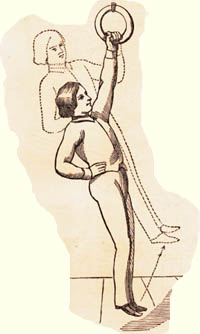 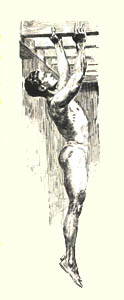 Historical
Performances Historical
Performancesin Chin-ups, Pull-ups, Levers, and Crosses . . . Basic Feats of Suspended Bodyweight Strength Associated with Rock Climbing |
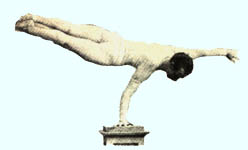 Among
climbers, rumors of considerable pulling or leverage strength are
common. Post a
thread on one-arm pull-ups on an interactive climbing
website and you
may get replies citing mysterious, frequently
unnamed athletes who have shown incredible
strength, endurance,
and power. Among
climbers, rumors of considerable pulling or leverage strength are
common. Post a
thread on one-arm pull-ups on an interactive climbing
website and you
may get replies citing mysterious, frequently
unnamed athletes who have shown incredible
strength, endurance,
and power. Professor
P. H. Paulinetti
Philadelphia
ca. 1900
In an effort to bring some sort of order into these kinds of discussions - particularly regarding historical performances - I turned to several sources, the most extensive being The Super Athletes (1970) by the late David P. Willoughby, an ex-body builder, medical illustrator, and perhaps the twentieth century's foremost authority on the subject of muscular accomplishments. Since climbers tend to be more interested in pulling activities, I have focused on these athletic specialties, although I do mention several outstanding pressing performances afterwards. In the first table, OAC = one arm chins, OAP = one arm pull-ups , RA = right arm, RH = right hand, etc. In my experience chin-ups tend to be a bit easier than pull-ups, but I have made no distinction here (although pull-up type muscle-ups are quite a bit easier than chin-up type muscle-ups). I have focused primarily on one-arm feats as opposed to records for consecutive two-arm chins, etc. (I think I have heard that the record for consecutive two-arm chin-ups is around 120, performed by an Asian). Most of the entries are from Willoughby's splendid book, and he makes no claim of infallibility - indeed, some are admitted rumors. But this is perhaps the best that can be done. The only entry I am reasonably certain about is my own - not in Willoughby's book - and I will freely admit that my one-arm pull-ups were not done from a completely extended dead hang, for to do so at my weight invites injury. But I did not use body momentum. I cannot comment on the chinning form adopted by each of these other athletes. Some may have started each chin-up from full or near-full extension while others may have barely dipped below the bar. And then there is the question of body momentum. Nevertheless, these are truly amazing accomplishments, and I suspect many if not most are fairly accurate. Let us hope so, for if true these feats and the men and women who performed them deserve our acknowledgement and respect. 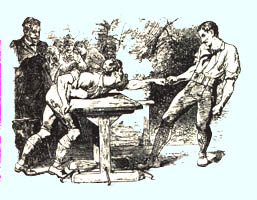 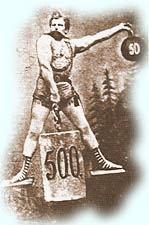 Some
of
the feats described below are one-finger,
one-arm chins. One-finger
feats probably began with the ancient sport of Fingerhakeln,
practised in the taverns of Bavaria. Some
of
the feats described below are one-finger,
one-arm chins. One-finger
feats probably began with the ancient sport of Fingerhakeln,
practised in the taverns of Bavaria.Hans Steyrer, Munich 1878 To put these in perspective: the world's record for lifting a heavy object from the floor using only one finger is 760 lbs., established by R. Weeks in 1941. After the performance table, I discuss the various personalities, and attempt to establish some sort of pecking order for those feats involving one-arm chins - using highly questionable, somewhat tongue-in-cheek techniques inspired by Willoughby's undocumented ranking algorithm. Competitive rope climbing is an event that is closely allied to one-arm chins and front levers. To read of this fascinating athletic skill, go to a separate section of this website: The Rope Climb |
Bodyweight Feats & Rock Climbing . . . It is impossible to arrive at a consensus among climbers as to the extent primordial strength moves such as one-arm pull-ups contribute to one's climbing performance. Personally, I think that anatomical genetics play a greater role, having observed climbers of all shapes and sizes for more than fifty years. At times, however, such abilities - at the very least - allow the climber to add an artistic flair to his craft. One thing is certain : the cultivation of gymnastic strength must be supported by good climbing technique in order to reap a benefit from the former. In the mid 1950s, when I started performing these kinds of rudimentary feats, very few climbers did any significant exercises to enhance their climbing performances, and I found myself exceeding existing standards - sometimes by significant margins. Now, however, training procedures are commonplace, and climbing-specific devices - such as campus boards - contribute greatly to certain kinds of rock work. As for the value of more general bodyweight stunts, like front levers and one-finger pull-ups on slings or bars, I prefer to think of these feats as complementary to climbing and as non-climbing goals, much like slackline walking. They provide a challenging divertissement to a sport too many pursue with single-minded, even ascetic devotion. |
Feats . . .
| Year | Name | Ht (inches) | Wt (lbs) | Feat(s) |
| ca 1860 | George Barker Windship | 67 | 135 | OAC with the little finger. Said to have jumped rungs of overhanging ladder with one hand. |
| 1878 | A. Cutter | ? | 115? | 12 OAC. 6 OAC with little finger of one hand. |
| ca 1895 | Oscar Matthes | 58.7 | 107 | 3 OAC with RA. 42 Chins. |
| ca 1895 | Eugen Sandow | 67.7 | 186 | 1 OAC with each finger, including the thumb, both hands (on a loop of small diameter rope). |
| ca 1900 | Adrian P. Schmidt | ? | 126 | 10 OAC with middle finger of RH. |
| ca 1900 | Paul Von Boeckmann | 72 | 185 | 3 OAC with middle finger of RH. |
| 1913 | Anton Lewis | ? | ? | 78 chins. |
| 1914 | Francis Lewis | ? | 158 | 7 OAC with middle finger LH. 1 OAC with little finger. 50 Chins. |
| 1915 | Henry Sincosky | 67 | 175 | Several squeeze-grip chins on rafters 18 inches apart. "Walking" the rafters for a distance of 6 feet. |
| 1917 | Robert Snyder | 64.5 | 130 | 9 OAC with RA. |
| 1918 | Gilbert Neville | 66 | 126 | 6 OAC + 56 lbs. with LA |
| 1918 | Lillian Leitzel | 57 | 95 | 27 Dynamic OAC with RA on a suspended ring = maximum of 6 proper OAC. (analysis by D. P. Willoughby, 1970) |
| ca 1920 | Joseph Prada | 61? | 120 | 1 OAC + 56 lbs. Straight arm mount to cross on rings while wearing 10 lb. weight. |
| 1925 | Boyd Shearer | ? | 160 | 1 OAC + 40 lbs. |
| ca 1927? | Stanley Ballis | ? | ca 135 | 7 OAC with RA. 1 OAC + 30 lbs. with RA. 1 Chin + 135 lbs. 6 Chins squeeze-gripping 4 inch beams. |
| 1927 | Everett Marshall | ? | 226 | 1 OAC. 28 Chins. |
| 1938 | Bert Assirati | 66 | 240 | 3 OAC. Cross on the rings at 266 lbs. |
| 1939 | Steve Stanko | ? | 220 | 3 OAC. |
| 1940 | Harry Rogal | 64 | 108 | 3 OAC + 50 lbs. |
| 1940 | Jasper Benincasa | 67.5 | 130 | From Benincasa: 1Chin
+ 265
lbs. He claims to have done a cross while
supporting an additional 90 lbs. And a cross with one finger
on
each ring. From
Willoughby: 14
consecutive OAC. One-finger one-arm front lever on a ring
(middle finger) - 1946. |
| 1940 | John Davis | ? | 190 | 3 OAC + 25 lbs. |
| ca 1940 | Walt Metzler | ? | ca 170 | A squeeze-grip chin on two 2" thick rafters while carrying an additional 75 lbs. |
| 1940? | Ben Piers | ? | 150 | One-finger one-arm front lever on a ring (middle finger), then chinning to the ring in that position - at age 60. |
| 1941 | Al Berger | 71.5 | 193 | 12 pinch-grip chins on rafters 30" apart., 6 with additional 10 lbs., once with additional 43 lbs. |
| 1945 | Tony Terlazzo | 64.5 | 148 | 10 straight body pulls from hang into front levers. |
| ca 1945 | Jack Reid | 73 | 215 | 7 OAC. 1 OAC + 50 lbs. |
| 1948 | Bill Trumbo | 72.8 | 225 | 13 "chins" on vertical bar while holding the flag position. |
| 1951 | Malcom Brenner | ? | 235 | 28 Chins. |
| 1953 | Marvin Eder | 67.5 |
197 | 7 Chins + 200 lbs. |
| 1954 | Jim Payne | 64.5 | 148 | Held cross while wearing 60 lbs of extra weight. |
| 1957 | Jack Delinger | 66.5 |
195 | 5 OAC. Held cross with 45 lbs. of added weight. |
| 1958 | John Gill | 74 | 178 | A number of OAP with and without weights, OAP on one finger, and OAP on a 1/2"surface. One-arm front lever pull-up. Other feats listed in Table 2. |
| 1963 | Ed Kreusser | ? | 235 | 30 Chins. |
| 1963? | Blanche Rassana? | 60? | 100? | 6 OAC. |
| ca 1963 | Jack Arnow | ? | 135 | 7 OAC. 1 OAC + 35 lbs. |
| 1964 | Yuri Vlasov | 72 | 280 | 1 OAC - very impressive at this weight. |
| 1965 | Pat Ament | 70.5 | 150 | 125 fingertip pull-ups in 5 minutes, etc. |
| 1966 | Jack La Lanne | 67 | 175 | Held perfect flag lever with 77.75 lbs. tied to his waist. |
| 1969 | William D. Reed | ? | ? | Did a record 106 consecutive pull-ups with both arms. |
| 1978 | Jim Holloway | 78 | 165? | Held front lever for at least 20 seconds, perhaps a minute. May be the tallest person ever to do a front lever. |
| 1978 | John Curd Edmunds | 70.5 | 167 | Did a record 117 consecutive dynamic pull-ups at age 66. |
| 1980 | John Bachar | 67 | 175 | 1 OAP + 12.5 lbs. Two-arm pullup + 138.75 lbs. |
| 1982 | Wolfgang Güllich | 70 | 150 | One arm pullup on one finger & OAP on small ledge + ? |
| 1982 | Rob Chisnall | 65 | 135 | 22 one-arm pullups on a suspended ring - right arm (whether dynamic or static is unknown). Also, 18 two-finger chins and 12 one-finger chins on a nylon strap. |
| 1985 | Milos Snajdr | 240 | 6 two-arm chins + 266 lbs. | |
| 2006 | Jason Armstrong | 74 | 183 | 2,409 pull-ups in a 12 hour period. |
| 2007 | Guy Schott | 68 | 150 | 3,116 pull-ups in 91/2 hours. |
About the Athletes . . .
| George Barker Windship | 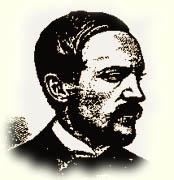 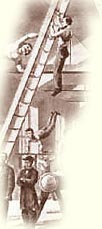 A graduate of Harvard Medical School, Windship is well-known to weightlifters as the Father of American Weightlifting. As a Harvard freshman, age 16, he was only 60" tall and weighed 100 lbs. Windship took up gymnastics, then moved on to lifting, inventing weightlifting devices and lecturing across America. |
| A. Cutter | A resident of Louisville , Kentucky, Cutter demonstrated these feats on September 18, 1878. |
| Oscar Matthes | A diminutive performer from Lawrence, Mass., Matthes was called The Miniature Sandow. 1863 - 1950. |
| Eugen Sandow |  Born in Königsberg, East Prussia in 1867, extrememly agile but with enormous strength, Sandow was more a gymnast than merely a weightlifter. Billed The Great Sandow, I read somewhere he could hop up the rungs of an inverted ladder using only one hand - as his American predecessor, G. B. Windship, had done. He was a friend of Oscar Eckenstein, the first documented boulderer. Sandow in 1891 |
| Adrian P. Schmidt | A physical instructor and strongman in New York City at the turn of the century. |
| Paul Von Boeckmann | 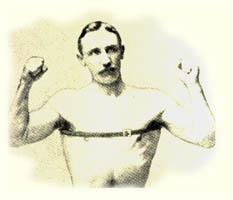 An instructor in health and body building in New York City toward the end of the 19th century. He could tear a quarter-size piece out of a deck of cards using only his thumb and forefinger. A one-time professional cyclist, he became an expert on deep breathing and lung development. |
| Anton Lewis | A resident of Brockton, Mass. |
| Francis Lewis | A resident of Beatrice, Neb. |
| Henry Sincosky | He "walked" by squeeze-grip chinning halfway, then giving a kick and a hitch with his legs and arms, and moving one hand ahead a few inches. Philadelphia. A witness said he had never heard of anyone else being able to do this. |
| Robert Snyder | A lightweight champion lifter from Hagerstown, Md. |
| Gilbert Neville | 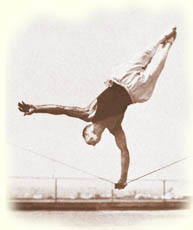 A professional balancing artist who trained in the Los Angeles Athletic Club. Neville was tubercular and eventually succumbed to that disease. He could perform a one-arm handstand on a swinging slackwire. He could also lower on one arm from a handstand into an L-position, then press up to a handstand 14 times in succession. He could perform a handstand dip and press-up while carrying an extra 112 pounds of weight. |
| Lillian Leitzel |
 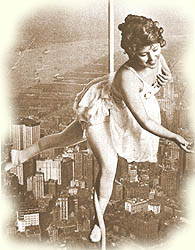 Born
Lillian Alize
Pelikan in Poland in 1892, the petite Leitzel did a
ring routine with Ringling Bros. and Barnum & Bailey
Circus during
the
1920s in which she performed Giant
Revolutions (or one-arm
swings) - actually back dislocations done with one arm -
reaching a record 249 in succession. These days she is remembered for
her putative record number of Born
Lillian Alize
Pelikan in Poland in 1892, the petite Leitzel did a
ring routine with Ringling Bros. and Barnum & Bailey
Circus during
the
1920s in which she performed Giant
Revolutions (or one-arm
swings) - actually back dislocations done with one arm -
reaching a record 249 in succession. These days she is remembered for
her putative record number of  one-arm
chins - 27
- done in
William
Hermann's Gymnasium in Philadelphia in 1918. It is said she did these
merely as a warm-up for some gymnastics she was to do for a
photographer. one-arm
chins - 27
- done in
William
Hermann's Gymnasium in Philadelphia in 1918. It is said she did these
merely as a warm-up for some gymnastics she was to do for a
photographer. 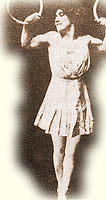 In The Super Athletes, David P. Willoughby does a detailed analysis of this claim, and arrives at the convincing conclusion that Leitzel did these very dynamically, like her ring routine, and that she should be given credit for at most 6 one-arm chins done properly - a conclusion reinforced by a European female gymnast reporting a record 6 one-arm chins in the late 1950s or early 1960s. Leitzel died from a fall from the rings in 1931. For additional information go here: Lillian Leitzel |
| Joseph Prada | A Mexican ring performer. |
| Boyd Shearer | A resident of Portland, Ore. |
| Stanley Ballis | Was able to perform these feats at the age of 15. |
| Everett Marshall | A heavyweight professional wrestler. |
| Bert Assirati | 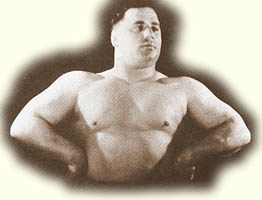 Born in England, a European professional wrestling champion, a record-holding weightlifter, and a skilled gymnast. He could hold a one-arm handstand at 266 lbs. and could perform a series of back somersaults with lightness and grace. Also a long distance cyclist. |
| Steve Stanko | 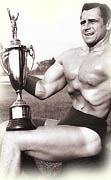 Mr. America of 1944. The first Mr. Universe (1947). The National Heavyweight Lifting Champion in 1938, 1939, and 1940. The first weightlifter to total over 1,000 lbs. in the three Olympic Lifts, in 1941. |
| Harry Rogal | No information available. |
| Jasper Benincasa | 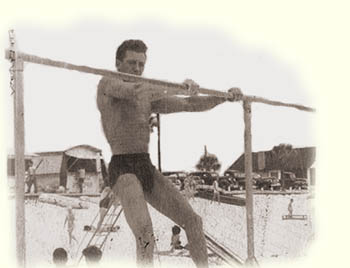 A
former resident of Brooklyn, NY, Benincasa, now in his 80s, lives in
Las Vegas. He has relearned a
one-arm chin, despite a lack of muscle tissue - he credits his latest
achievement to "strong tendons and ligaments" and a diminished weight
of approximately 126 lbs. The photo to the left shows Jasper
doing what he called a "CTI" (Close To Impossible) - a levered position
that seems to defy the principles of physics,
clearly requiring a phenomenal grip. He said he held it for about 3
seconds. A
former resident of Brooklyn, NY, Benincasa, now in his 80s, lives in
Las Vegas. He has relearned a
one-arm chin, despite a lack of muscle tissue - he credits his latest
achievement to "strong tendons and ligaments" and a diminished weight
of approximately 126 lbs. The photo to the left shows Jasper
doing what he called a "CTI" (Close To Impossible) - a levered position
that seems to defy the principles of physics,
clearly requiring a phenomenal grip. He said he held it for about 3
seconds.Photo courtesy J. Benincasa & Jack Arnow Panama City, Florida ca 1940s |
| John Davis | 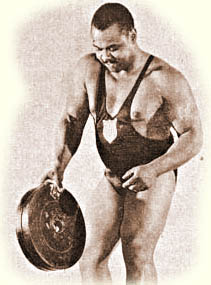 Heavyweight American amateur weightlifting champion in 1939, at age 18. He could do 10 consecutive handstand pushups at 200 lbs. and could do a handstand jump of 36" to the floor. |
| Walt Metzler | No additional information available. |
| Ben Piers | One-time physical director of the New Orleans YMCA on Charles Street. |
| Al Berger | Resident of Philadelphia, he later increased weight to over 220 lbs. |
| Tony Terlazzo | National and Olympic weightlifting champion in the lightweight class. |
| Jack Reid | 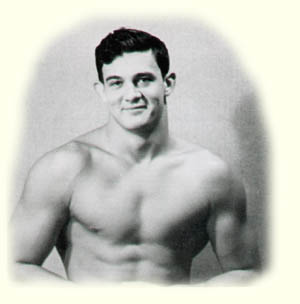 Strongman and CPA by profession. Tax columnist & owner of CPA firm. In older age, called himself "the world's strongest CPA". In addition to his pull-up strength, Reid could do 20 consecutive handstand pushups - probably a record for his weight class at that time (ca 1939). 1940 - Age 21 Photo courtesy of Brad Reid |
| Bill Trumbo | Muscle Beach performer and winner of chest development awards. |
| Malcom Brenner | Well-known weightlifter from Los Angeles, Calif. |
| Marvin Eder | 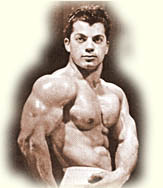 A weightlifter from Brooklyn, NY, Eder is said to have done 80 "wide-arm" chins when weighing over 190 lbs. He also pressed up into a support on the parallel bars with two men attached to his legs who weighed a total of 435 lbs. (1953). He could do 25 consecutive handstand push-ups on a horizontal ladder. |
| Jim Payne | 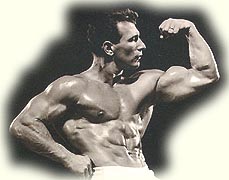 Pro Mr. America - 3rd place: 1948, 1949, 1951 |
| Jack Delinger | 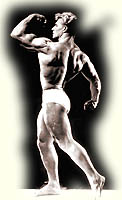 The 1949 Mr. America, Delinger was a versatile athlete, doing his early training in gymnastics. He became Mr. Universe in 1956. At the time he was the shortest man to achieve these honors. He once did an iron cross on the rings while his 28 lb. , 2 year-old son clung to his legs! |
| John Gill | 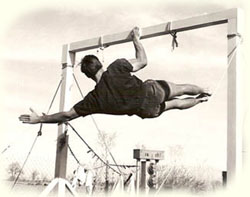 Mathematics
Professor Emeritus, Rock Climber, Amateur Gymnast [the author] More
Photos Mathematics
Professor Emeritus, Rock Climber, Amateur Gymnast [the author] More
PhotosOne Arm Lever Pull-up 1969 7 OAP RA, 5 OAP LA. 1 OAP + 20 lbs. 3 OAP on 1/2" ledge. 3 OAP with middle finger of each hand (on a 1" ring/bar). One-arm front lever with either arm. One-arm front lever pull-up. One-arm front lever with middle finger of RH. Several squeeze grip chins on a single beam and on parallel beams (a front lever here, also). On one occasion: 1 OAC in squeeze-grip on a slightly warped and rough 2x6 joist. 10 consecutive muscle-ups (pull-up style), 5 muscle-ups (chin-up style). Two consecutive L-cross mounts on rings. Slow pull from a dead hang with straight body into either cross or handstand. Inverted and Olympic crosses. |
| Ed Kreusser | Weightlifter and athlete. |
| Blanche Rassana | Mysterious European female gymnast cited by Willoughby. No additional information available. |
| Jack Arnow | 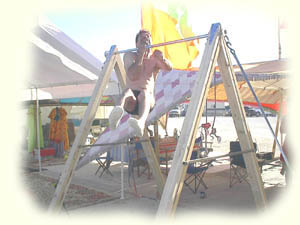 College Professor and pupil of Jasper Benincasa in the 1960s. Now 64 and 140 lbs., Jack is working up to a full additional bodyweight two-arm chin. He recently chinned + 110 lbs. Jack is the coauthor of a well-received one-arm chinning guide. Jack Arnow at 64 at Burning Man, 2007 |
| Yuri Vlasov |  Famous Olympic Champion superheavyweight weightlifter. Russian Master of Sports. Writer and politician. Vlasov at the 1963 World Championships |
| Pat Ament | 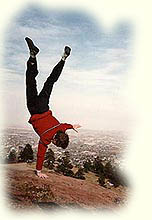 Writer, Poet, Artist, Rock Climber, Pioneer Boulderer.
Writer, Poet, Artist, Rock Climber, Pioneer Boulderer.15 consecutive handstand push-ups. 125 fingertip pull-ups in 5 minutes. 125 dips on the parallel bars in 5 minutes. One-arm handstand for 22 seconds. One-arm mantleshelf. Ament could do a number of difficult presses to handstand, as well as a slow muscle-up on a bar, turning both hands simultaneously. Reached his peak in the mid 1960s. See: Pat Ament |
| Jack La Lanne | 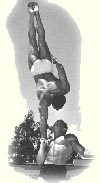 Everyone knows who this is! One of the world's greatest fitness gurus. La Lanne once did 40 consecutive handstand push-ups (Sun Valley, ca 1942). He also did 1,000 chin-ups in 1 hour and 22 minutes. Visit www.jacklalanne.com |
| William D. Reed | University of Pennsylvania gymnast. |
| Jim Holloway | 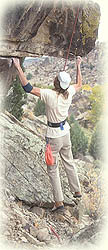 Holloway was one of the early bouldering superstars of America. Very tall and thin, he moved as gracefully as a Russian ballerina. He climbed during the 1970s. He put the lie to the assertion that very tall men could not perform a front lever. See: Jim Holloway Juggernaut 1978 |
| John Curd Edmunds | A farmer from Glasgow, Kentucky, Edmunds has been doing chin-ups and pull-ups for many years. At the age of 77 he could still do 32. Videos show, however, that Curd "kipped" his pull-ups and didn't do them statically, the way body-builders do. See: John Curd Edmunds |
| John Bachar | 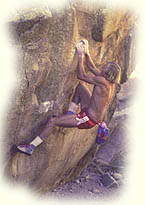 Brilliant American rock climber: he initiated very difficult free-solos on formations higher than 100 feet. He once challenged anyone to follow him on a day of soloing at Joshua Tree Monument, offering a prize of $10,000. Nobody accepted his challenge. Did overhanging ladder climbs + 25 lbs., for training. Admired by Güllich (below) as the best in the world. |
| Wolfgang Güllich | 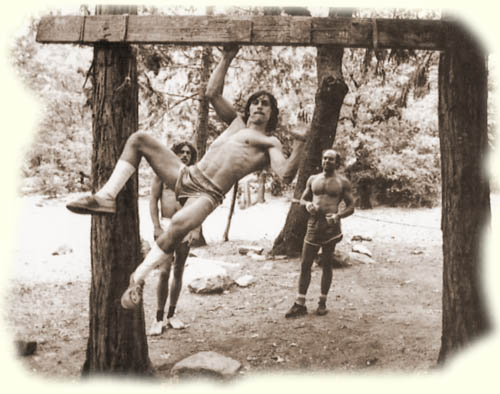 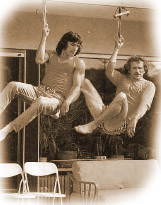 Yosemite 1982 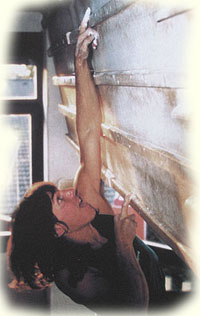 Gullich &
Kurt Albert 1987 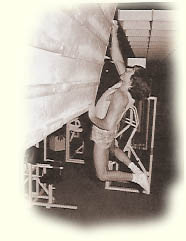 Although he trained rigorously there are few facts - but a lot of speculative assertions - concerning his bodyweight feats, other than a one-finger one-arm pullup in a TV film. (Sylvestor Stallone saw this and called for Wolfgang to help with stunts in the movie, "Cliffhanger"). He created - as preparation for his ascent of Action Directe - what has become known as the "campus board" - a slightly overhanging board with a series of horizontal wood strips simulating rock ledges, which he climbed up and down with his feet hanging beneath, sometimes with only one finger of each hand. |
| Rob Chisnall | 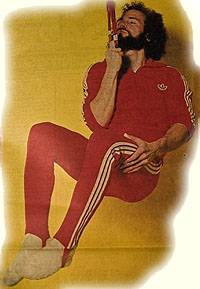 Born 1952, Rob was a rock climber who has become an acknowledged expert in knot analysis. His record of 22 one-arm chins - done on a suspended ring, like the one used by Lillian Leitzel in 1918 - was briefly noted, without comment regarding dynamic or static style, in the Guinness Book of World Records(1989). Reportedly, he also did one-arm levers and various other bodyweight feats. |
| Milos Sanjdr | Famous CSE weightlifter. |
| Jason Armstrong | 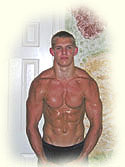 Young athlete set record in November, 2006, at Gymnastics Plus in Southlake, Texas. See his Strategy for Breaking the Record |
| Guy Schott | 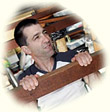 Schott, a sanitary engineer by profession and a distance runner, did 644 pull-ups in one hour in October 2005 - a record that lasted two months. He also did 3,116 in 91/2 hours in April, 2007 - quitting at that point in his successful effort to break the 12 hour record. He was 44 years old at the time. |
|
The Lifted-Weight Algorithm An extremely simplistic ranking mechanism that is based upon the accumulated weight lifted through recorded consecutive one-arm chins. E.g., if an athlete weighs 150 lbs. and does 5 one-arm chins while carrying an additional weight of 30 lbs., then Total Weight = 5 x (150+30) = 940. These figures will be a little high, since I have not compensated for the fact that the hands and forearms are not lifted. The procedure does attempt to balance the performances of very light athletes (for whom chins are easier) with those of heavier athletes (for whom chins are harder). However, we deal here with an incomplete set of facts. For instance, Gilbert Neville may have performed significantly more one-arm chins without the extra 56 lbs. of weight, bringing his Total Weight to a much higher level. In this algorithm, no attempt will be made to use a device like the Epley Equation to convert to number of chins without added weight. Only data from observed performances is used. No additional points are given when the chins are done with a single finger - usually the middle finger, in which a great deal of hand strength reposes. |
| Rank | Athlete | Total Weight |
| 1 | Jasper Benincasa | 1,820 |
| 2 | Jack Reid | 1,505 |
| 3 | A. Cutter | 1,380 |
| 4 | Adrian P. Schmidt | 1,260 |
| 5 | John Gill | 1,246 |
| 6 | Robert Snyder | 1,170 |
| 7 | Francis Lewis | 1,106 |
| 8 | Gilbert Neville | 1,092 |
| 9 | Jack Delinger | 975 |
| 10 | Stanley Ballis/Jack Arnow | 945 |
|
The Single-Chin Reduction Algorithm #1 In this ranking process, an attempt is made to reduce several one-arm chins to an "equivalent" single one-arm chin plus an additional percentage of the athlete's body weight. For example, suppose an athlete weighs 150 lbs. and does 5 one-arm chins while carrying an extra 30 lbs. of weight. A percentage reduction factor of 3.8% will be applied to each chin, as follows: The 30 additional pounds is 20% of his body-weight. Hence his performance is equivalent to him doing 4 one-arm chins while carrying an additional percentage of body-weight of 23.8%. Or 3 one-arm chins while carrying an additional 27.6% . . . down to a single one-arm chin while carrying an additional 35.2% of body-weight. I may change the algorithm if something better appears, and as before I have not compensated for hands and forearms. This scheme favors the light performer and illustrates the "mouse/elephant" effect, wherein lighter creatures have disproportionately higher strength. The factor of 3.8% comes from two of the observations in this study, and is mildly consistent with Willoughby's undocumented equivalence procedure. When applied to Jasper Benincasa, the result (64 lbs) is a few pounds higher than the figure obtained with the Epley Equation (60 lbs), but roughly the same, while the Brzycki and Lander Formulae give results of 74 and 73 lbs., respectively. None of these simple formulae are expected to be of much value after 10 reps. On the other hand, Jack Reid's performances - with and without added weight - are entirely consistent with algorithm #1, which gives 23% , the actual observed percentage. The Epley Equation gives 23% also, the Brzycki Equation gives 20%, and the Lander Equation gives 21%. |
| Rank | Athlete (weight) | Single
One-arm Chin + % Bodyweight |
| 1 | Gilbert Neville (126) | 63% |
| 2 | Harry Rogal (108) | 54% |
| 3 | Jasper Benincasa (130) | 49% |
| 4 | Joseph Prada (120) |
47% |
| 5 | Robert Snyder (130) | 30% |
| 6 | Jack Arnow (135) (actual) | (26%) |
| 7 | Boyd Shearer (160) |
25% |
| 8 | Jack Reid (215) | 23% |
| 9 | Stanley Ballis (135) | 23% |
| 10 | John Gill (178) |
23% |
| Related
Websites www.crossfit.com www.DragonDoor.com www.drillsandskills.com Chinup Records Website |
To contact me, send an e-mail to johngill1 at live dot com
Return to www.johngill.net